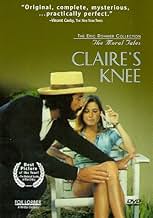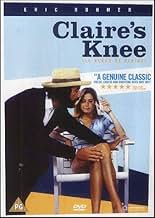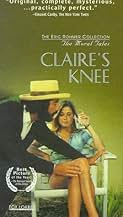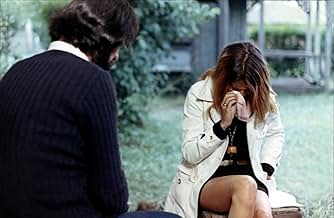VALUTAZIONE IMDb
7,5/10
13.243
LA TUA VALUTAZIONE
In vacanza estiva al lago, un uomo in conflitto ha il coraggio di flirtare con due bellissime sorellastre adolescenti nonostante il suo fidanzamento con la figlia di un diplomatico e il fatt... Leggi tuttoIn vacanza estiva al lago, un uomo in conflitto ha il coraggio di flirtare con due bellissime sorellastre adolescenti nonostante il suo fidanzamento con la figlia di un diplomatico e il fatto che le ragazze abbiano anche dei fidanzati.In vacanza estiva al lago, un uomo in conflitto ha il coraggio di flirtare con due bellissime sorellastre adolescenti nonostante il suo fidanzamento con la figlia di un diplomatico e il fatto che le ragazze abbiano anche dei fidanzati.
- Regia
- Sceneggiatura
- Star
- Premi
- 6 vittorie e 4 candidature totali
Recensioni in evidenza
The title of this charming film by Eric Rohmer is perhaps too provocative. It really gives the wrong impression, yet Claire's knee is exactly the central point of the film, although in a way that will surprise you. This is the story about a thirty-something year old diplomat, Jerome Montcharvin, who encounters two pretty girls, sixteen and eighteen years old, while on vacation at Lake Annecy in France (near Lake Geneva, Switzerland) a month before his wedding and finds that they affect him more strongly than he might have expected. It is especially Claire who brings out a side of his personality that is seldom exposed, much to the merry interest of his friend, Aurora, a writer, who has guided his interest in the girls, ostensibly as material for a story she is writing. Claire's Knee, it need be said immediately has not so much to do with the pretty girl's knee as it has to do with the protagonist's self-perception. Jean-Claude Brialy, who plays Jerome Montcharvin, brings a veracious mix of smug confidence and little guy vulnerability to the part spiked with a clear case of self-delusion that illuminates his character very well. And the girls are indeed very pretty, with Laura, played with coquettish innocence by Béatrice Romand, also being clever and slyly sophisticated, vulnerable and honest. In contrast Claire, played by Laurence de Monaghan, whose fawn-like beauty is perfect for the part, seems superficial and ordinary and a bit distant. I found myself more attracted to Aurora, played with a gentle and understated irony by Aurora Cornu. She provides the objectifying point of view for us to realize that while Jerome imagines he is a man in touch with his feelings and has an objective understanding of himself, he is really a man who fools himself about his motivation, a man who can be ugly when frustrated, as he is by Claire's lack of interest in him. The dialogue, written by director Eric Rohmer, which some have found excessive is anything but. It is instead clever and witty and at times profound as Rohmer relentlessly explores the nature of love, sex, sensuality and self-delusion. The cinematography of the lake and the French alps in the summer time is luscious, and the privileged, softly indulgent life style of the characters living around the lake provoked a twinge of jealousy in my soul. This is a beautiful film, worldly wise, warm, sensual and subtle as a dinner by candlelight.
There's a lot to enjoy in Claire's Knee: the relaxed easy pace, the charming characters, the warm and insightful conversations, the stunning scenery of the French Alps.
Unfortunately I can't find any way to identify or empathize with a world that is so comfortable, so boring, so unambiguous, and ultimately, so superficial. None of the characters seem to work; no-one ever seems anxious or troubled; nothing particularly bad or good happens, or seems likely to ever happen. It's a film of low-level emotions, and low stakes -- for the characters, and for the viewers.
In this bland world, the only question of importance becomes: will the main character, a man of 35 or older, seduce one of the two teenage beauties? No particularly momentous moral calculus is involved, and ultimately the stakes were so low that I could not bring myself to care. The character is good man, or he's a lecher, or he's neither...but I feel Rohmer did not give me any reason why any of this might matter.
Claire's Knee is a hymn of praise to French charm, bourgeois comforts, and inconsequential easy pleasures. If that's your thing, enjoy yourself with this film. Me, I'll be over there in the corner, watching films by directors that ask harder questions.
Unfortunately I can't find any way to identify or empathize with a world that is so comfortable, so boring, so unambiguous, and ultimately, so superficial. None of the characters seem to work; no-one ever seems anxious or troubled; nothing particularly bad or good happens, or seems likely to ever happen. It's a film of low-level emotions, and low stakes -- for the characters, and for the viewers.
In this bland world, the only question of importance becomes: will the main character, a man of 35 or older, seduce one of the two teenage beauties? No particularly momentous moral calculus is involved, and ultimately the stakes were so low that I could not bring myself to care. The character is good man, or he's a lecher, or he's neither...but I feel Rohmer did not give me any reason why any of this might matter.
Claire's Knee is a hymn of praise to French charm, bourgeois comforts, and inconsequential easy pleasures. If that's your thing, enjoy yourself with this film. Me, I'll be over there in the corner, watching films by directors that ask harder questions.
In "les Liaisons Dangereuses", Isabelle de Merteuil defies Sebastien de Valmont to deflower Cécile de Volanges, a young girl, then to seduce and to reject Marie de Tourvel, a married woman. If he succeeds in accomplishing it, the bounty will be Isabelle herself.
Nothing as harsh in "Le genou de Claire", but there is the similar thematic about a gamble. Jérome (Jean Claude Brialy) meets Aurora (Aurora Cornu), an old friend (lover?). Aurora, a writer, is in search of a new story for a possible novel. She offers Jérome a gamble in the form of a love game ("marivaudage" as we say in French) involving Laura (Beatrice Romand), his neighbors daughter, who is obviously attracted by him, and, later, the Laura's sister Claire (Laurence de Monaghan) whose knee fascinates Jérome.
Unlike "The Dangerous Liaisons", not a single ounce of violence or dramatic events, everything will be just metaphorical: a half-stolen kiss and a stroked knee (and no excessive promised reward from Aurora). "Le Genou de Claire" is a filmed essay about friendship, love, sensuality, desire, fantasies and their incoherences.
As usual with Eric Rohmer, thoughts and emotions have to be said and not just shown, therefore everything is explicitly said by the characters. This is the reason why the Rohmer's movies seem unrealistic and talkative to the unprepared audiences. Some say that Rohmer is a writer who uses a camera instead a pen, but that primacy of the dialog doesn't prevent Rohmer to use the actor's play, the camera, the set's and costumes colors in a very accurate way. In fact, he is a real film director with a very personal style of cinematic language.
The cast: A Jean-Claude Brialy bearded like a pirate plays a charming young diplomat and he delivers his lines with natural ease and a sensual chemistry between him and the beautiful Aurora Cornu (a Romanian poet, novelist, and actress). Unfortunately the Romanian actress doesn't seem at ease with those long lines in French, and, in my humble opinion, she overplays quite a bit.
Beatrice Romand, 18 years old at that time, in her first true part in a movie, plays the 16 yo Laura. She steals the show, the light and the camera, and in view of some mind-blowing shots, for example in the Jérome's room, she seems to have been an obvious delicacy to light up for the great master Néstor Almendros, in charge of the cinematography. When the movie was released in 1970, the French medias became suddenly obsessed for a while by this very young actress, her exotic beauty and riveting charm. The clever and fizzy Béatrice appeared everywhere in the magazines and on the 2 (not more than two in 1970!) channels of the French TV! Then the fame faded away. The industry of entertainment prefers the blonds... The Beatrice's fans (I am a Beatrice's fan!) love Rohmer's "Le Beau Marriage", "Conte d'Automne" and Claude Faraldo's "Themroc", a situationist weird movie.
Laurence de Monaghan, in contrast with the dark haired and milky skinned Beatrice Romand, plays Claire, a tanned blond of cold beauty, in fact a perfect arrogant and stuck-up chick with perfect body, legs and knee, the famous knee, object of Jérome's desire.
For the fans of Fabrice Luccini, his short part as the young Vincent pontificating about girls is a "collector", not to be missed! By the way, still for his fans, not to be missed too there is his hilarious (and sulfurous) part in Walerian Borowczyk's "Contes Immoraux" (Immoral Tales) 2 years later. Keep in mind that "Le Genou de Claire" forms a part of Rohmer's "Contes Moraux" (Moral Tales)...
Time has passed, "Le Genou de Claire" remains amongst the Rohmer's most sensuous movie, and Claire's knee keeps on fascinating.
Nothing as harsh in "Le genou de Claire", but there is the similar thematic about a gamble. Jérome (Jean Claude Brialy) meets Aurora (Aurora Cornu), an old friend (lover?). Aurora, a writer, is in search of a new story for a possible novel. She offers Jérome a gamble in the form of a love game ("marivaudage" as we say in French) involving Laura (Beatrice Romand), his neighbors daughter, who is obviously attracted by him, and, later, the Laura's sister Claire (Laurence de Monaghan) whose knee fascinates Jérome.
Unlike "The Dangerous Liaisons", not a single ounce of violence or dramatic events, everything will be just metaphorical: a half-stolen kiss and a stroked knee (and no excessive promised reward from Aurora). "Le Genou de Claire" is a filmed essay about friendship, love, sensuality, desire, fantasies and their incoherences.
As usual with Eric Rohmer, thoughts and emotions have to be said and not just shown, therefore everything is explicitly said by the characters. This is the reason why the Rohmer's movies seem unrealistic and talkative to the unprepared audiences. Some say that Rohmer is a writer who uses a camera instead a pen, but that primacy of the dialog doesn't prevent Rohmer to use the actor's play, the camera, the set's and costumes colors in a very accurate way. In fact, he is a real film director with a very personal style of cinematic language.
The cast: A Jean-Claude Brialy bearded like a pirate plays a charming young diplomat and he delivers his lines with natural ease and a sensual chemistry between him and the beautiful Aurora Cornu (a Romanian poet, novelist, and actress). Unfortunately the Romanian actress doesn't seem at ease with those long lines in French, and, in my humble opinion, she overplays quite a bit.
Beatrice Romand, 18 years old at that time, in her first true part in a movie, plays the 16 yo Laura. She steals the show, the light and the camera, and in view of some mind-blowing shots, for example in the Jérome's room, she seems to have been an obvious delicacy to light up for the great master Néstor Almendros, in charge of the cinematography. When the movie was released in 1970, the French medias became suddenly obsessed for a while by this very young actress, her exotic beauty and riveting charm. The clever and fizzy Béatrice appeared everywhere in the magazines and on the 2 (not more than two in 1970!) channels of the French TV! Then the fame faded away. The industry of entertainment prefers the blonds... The Beatrice's fans (I am a Beatrice's fan!) love Rohmer's "Le Beau Marriage", "Conte d'Automne" and Claude Faraldo's "Themroc", a situationist weird movie.
Laurence de Monaghan, in contrast with the dark haired and milky skinned Beatrice Romand, plays Claire, a tanned blond of cold beauty, in fact a perfect arrogant and stuck-up chick with perfect body, legs and knee, the famous knee, object of Jérome's desire.
For the fans of Fabrice Luccini, his short part as the young Vincent pontificating about girls is a "collector", not to be missed! By the way, still for his fans, not to be missed too there is his hilarious (and sulfurous) part in Walerian Borowczyk's "Contes Immoraux" (Immoral Tales) 2 years later. Keep in mind that "Le Genou de Claire" forms a part of Rohmer's "Contes Moraux" (Moral Tales)...
Time has passed, "Le Genou de Claire" remains amongst the Rohmer's most sensuous movie, and Claire's knee keeps on fascinating.
I think the moral point of "Claire's Knee" (probably not Rohmer's) is that Jerome's conversion from womanizer to a serious and challenging relationship with Lucinde, is flawed. And that the flaw is his invoking the escape hatch of an "open marriage." He (or his new persona) half believes that he will not use it, but the accidental presence of two enticing teenagers at his Lake Annecy vacation sets the stage for his self-delusion, his devaluation of intimacy, and for the resurfacing of his sensuous ways.
For "open marriage" as a cover for "adult," is really another form of ambivalence and duplicity. What it means to Jerome is that the door of puerile fantasy is at his fingertips. Thus in the rarified air of Annecy, in the flow of summer, thin, mod teenagers Laura and Claire become not only sex objects to Jerome, but potential love partners--one at 16, assessed as adult enough, and the other 18, assessed as legal. We see them together, he invariably clothed for late autumn weather, they for mid-summer. In the emotional cat and mouse games that ensue, Laura and Claire are, to him, mere temptresses, and perhaps part of a self-test, and not, in any sense, young women with lives of their own & chosen boy friends. Instead, their boundaries begin to blur under his voyeurism, his not so subtle acts of aggression, his familiar touching, fondling, pointed remarks, and prescriptive suggestions. He offers them no affection, no friendship, and no communication.
How could it be otherwise given their demure youth, beauty and his permissive "open marriage," and when possessing them is his goal--pederasty and fetishism his means. But his fling with inspiring youth having fulfilled his KNEEDS, he can now discard Laura and Claire without in any way having deviated from his new mature male role-- as willfully possessive as he's been. Whether Lucinde has actually signed off on the "open" deal or not, she, despite her maturity, worldly success, and her sculptured character, must be no more than a symbol to Jerome, extracted for his KNEEDS, which must come first before commitment and support.
For "open marriage" as a cover for "adult," is really another form of ambivalence and duplicity. What it means to Jerome is that the door of puerile fantasy is at his fingertips. Thus in the rarified air of Annecy, in the flow of summer, thin, mod teenagers Laura and Claire become not only sex objects to Jerome, but potential love partners--one at 16, assessed as adult enough, and the other 18, assessed as legal. We see them together, he invariably clothed for late autumn weather, they for mid-summer. In the emotional cat and mouse games that ensue, Laura and Claire are, to him, mere temptresses, and perhaps part of a self-test, and not, in any sense, young women with lives of their own & chosen boy friends. Instead, their boundaries begin to blur under his voyeurism, his not so subtle acts of aggression, his familiar touching, fondling, pointed remarks, and prescriptive suggestions. He offers them no affection, no friendship, and no communication.
How could it be otherwise given their demure youth, beauty and his permissive "open marriage," and when possessing them is his goal--pederasty and fetishism his means. But his fling with inspiring youth having fulfilled his KNEEDS, he can now discard Laura and Claire without in any way having deviated from his new mature male role-- as willfully possessive as he's been. Whether Lucinde has actually signed off on the "open" deal or not, she, despite her maturity, worldly success, and her sculptured character, must be no more than a symbol to Jerome, extracted for his KNEEDS, which must come first before commitment and support.
one of the most beautiful movie by Rohmer. when I saw this film for the first time i was in Brasil (Saao Paulo) and the movie was whistled at the end of the performance by the assistance. In fact, I found the movie a little bit ridiculous and native. i reviewed this movie on TV, a few years later, in France, and was then enthusiastic. I've since become a fan of Rohmer and I've seen nearly all of his films.
Lo sapevi?
- QuizNot counting a picture frame seen from a distance, the title character's first appearance takes place 47 minutes into the film.
- BlooperNear the end of the movie, Jerôme and Claire Annecy are going by boat to Annecy but must seek refuge under a shelter because of a storm. During their conversation, the irregular flow of the watering device used to create the big rain can be heard clearly.
- ConnessioniEdited into 365 days, also known as a Year (2019)
I più visti
Accedi per valutare e creare un elenco di titoli salvati per ottenere consigli personalizzati
Dettagli
Botteghino
- Lordo in tutto il mondo
- 5112 USD
- Tempo di esecuzione
- 1h 45min(105 min)
- Mix di suoni
- Proporzioni
- 1.37 : 1
Contribuisci a questa pagina
Suggerisci una modifica o aggiungi i contenuti mancanti

![Guarda Bande-annonce [OV]](https://m.media-amazon.com/images/M/MV5BMTgyOTk2NmMtZTk3ZS00Yjg4LWIwMzEtM2RmZDQ0ZWVhZWUzXkEyXkFqcGdeQXRyYW5zY29kZS13b3JrZmxvdw@@._V1_QL75_UY281_CR10)























